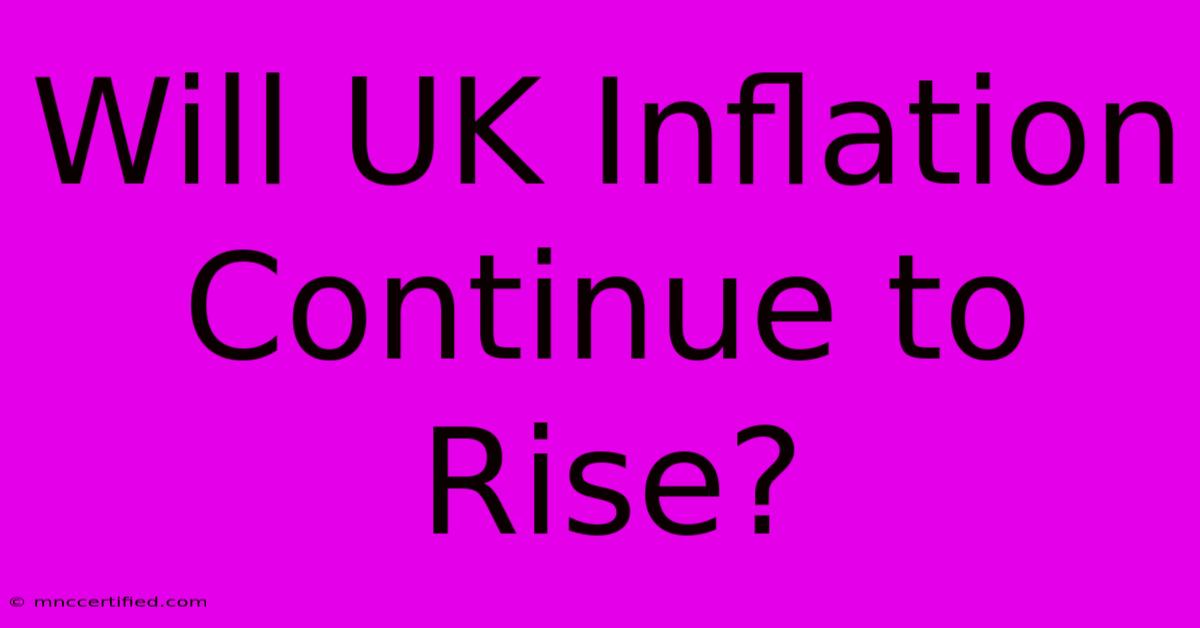Will UK Inflation Continue To Rise?

Table of Contents
Will UK Inflation Continue to Rise? A Deep Dive into the Economic Outlook
The UK's inflation rate has been a major talking point, impacting household budgets and the overall economy. But will this upward trend continue? This article delves into the factors influencing UK inflation, examining current data and expert predictions to offer a comprehensive perspective.
Understanding Current Inflation Levels
The UK's inflation rate, as measured by the Consumer Prices Index (CPI), has fluctuated significantly in recent years. While specific numbers change frequently, it's crucial to understand the contributing factors driving these fluctuations. Checking the latest official statistics from the Office for National Statistics (ONS) is essential for up-to-date information. Key indicators to watch include:
- Energy Prices: A major driver of inflation, energy price hikes directly impact household bills and manufacturing costs. Global energy market volatility plays a significant role here.
- Food Prices: Essential goods like food are highly susceptible to inflation. Supply chain disruptions, adverse weather conditions, and geopolitical events all impact food costs.
- Wage Growth: While wage increases can boost consumer spending, they also contribute to inflation if they outpace productivity growth. This creates a wage-price spiral, where rising wages lead to higher prices, which then necessitate further wage increases.
- Supply Chain Disruptions: Ongoing disruptions in global supply chains continue to impact the availability and cost of goods, contributing to inflationary pressures.
- Brexit: The long-term economic consequences of Brexit remain a significant uncertainty, influencing trade, investment, and ultimately, inflation.
Factors Suggesting Continued Inflation
Several factors suggest that UK inflation might persist, or even increase further, in the short to medium term:
- Persistent Energy Price Volatility: The global energy market remains unpredictable. Further geopolitical instability or supply shocks could lead to renewed price surges.
- Second-Order Effects of Inflation: Inflation tends to be self-reinforcing. As prices rise, consumers and businesses anticipate further increases, leading to higher wage demands and price setting, perpetuating the cycle.
- Global Inflationary Pressures: The UK is not immune to global economic trends. High inflation in other major economies can easily spill over into the UK market.
- Tight Labour Market: A shortage of skilled workers could lead to increased wage demands, potentially fueling further inflationary pressure.
Factors Suggesting a Potential Slowdown
Conversely, there are reasons to believe that inflation might eventually ease:
- Monetary Policy: The Bank of England's monetary policy, including interest rate hikes, aims to curb inflation by reducing consumer spending and investment. The effectiveness of these measures remains to be seen.
- Easing Supply Chain Pressures: While supply chain disruptions persist, there are signs of gradual improvement in some sectors. This could help alleviate inflationary pressures over time.
- Potential Economic Slowdown: A potential economic slowdown or recession could dampen consumer demand, reducing inflationary pressure. However, this would also come with its own set of economic challenges.
Expert Predictions and Forecasts
While predicting future inflation with certainty is impossible, various economic institutions and experts offer forecasts. These predictions should be viewed with caution, as they are based on models and assumptions that may not perfectly reflect future events. Consulting reputable sources like the Bank of England's Monetary Policy Report and reports from organizations like the IMF is crucial.
Conclusion: Navigating Uncertainty
The future trajectory of UK inflation remains uncertain. While various factors point towards both continued increases and potential slowdowns, keeping abreast of the latest economic data and expert analysis is crucial. Understanding the interplay between energy prices, supply chains, monetary policy, and global economic trends will be key to navigating this complex economic landscape. Regularly consulting official government sources and reputable economic news outlets is vital for staying informed. Remember, this article provides analysis based on current information; the situation is dynamic and requires ongoing monitoring.

Thank you for visiting our website wich cover about Will UK Inflation Continue To Rise?. We hope the information provided has been useful to you. Feel free to contact us if you have any questions or need further assistance. See you next time and dont miss to bookmark.
Featured Posts
-
Is Bridgewater An Emergency Qb Option
Dec 19, 2024
-
Honolulu Plane Crash Kills Two Pilots
Dec 19, 2024
-
Prosecuted For Stealthing Rape
Dec 19, 2024
-
Uk Inflation Rate Price Increase Outlook
Dec 19, 2024
-
Trinity Rodman On Fatherhood
Dec 19, 2024